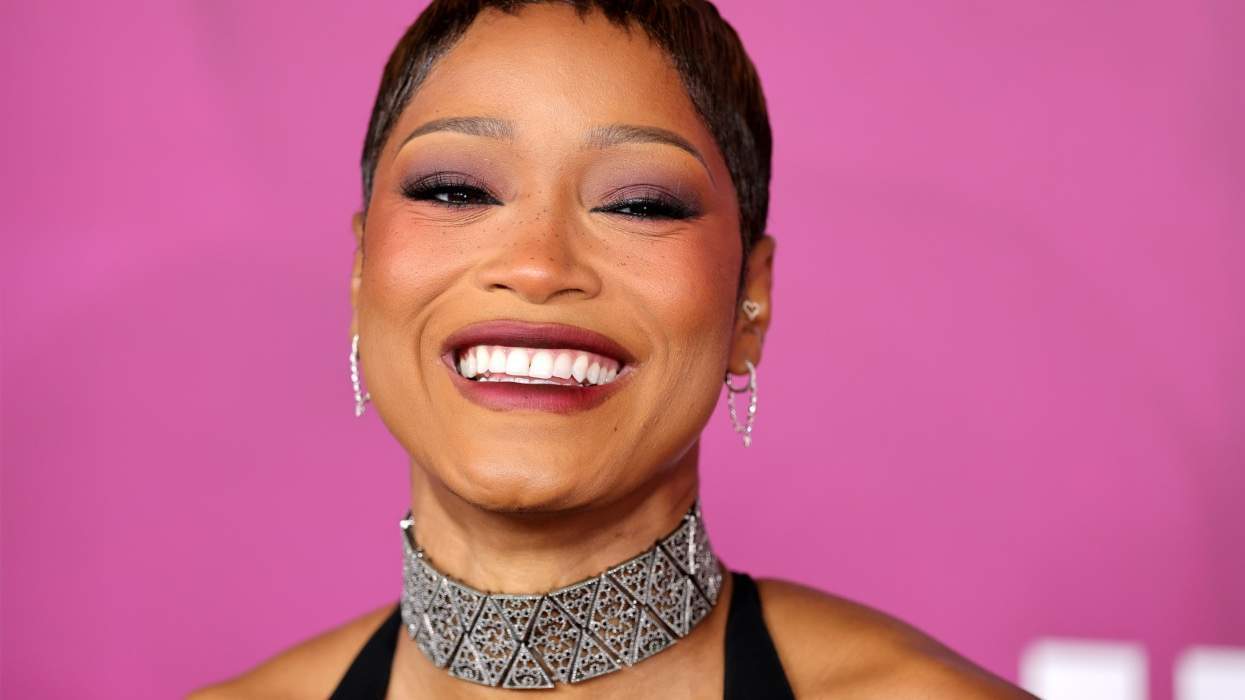The scene inside the cavernous warehouse on the banks of the East River looks something like a bohemian circus. Perched in front of makeup mirrors are lesbians with dreadlocks, ripped jeans, and knee-high boots; drag queens wearing violently colored wigs; and a man in a fleshy fat suit covered with plastic doughnuts. A buxom blond in a floor-length evening gown adjusts the pink flower pasties under her top, while members of a marching band mill about, warming up their trumpets and trombones. It's just another day on the set for director John Cameron Mitchell, who glides through the crowd in a spray-painted leather jacket, kissing hellos and making final preparations for a party scene in his sophomore film, Shortbus .
Regardless of what the actors are wearing on this day, it's what they're not wearing in much of the film that has generated all the early buzz. Four years after Mitchell put on a coifed blond wig and punk-rock T-shirt to become an East German transgender singer in Hedwig and the Angry Inch , the director is pushing new boundaries with an unfiltered look at sexual relationships that promises to make The Brown Bunny and Mysterious Skin look tame by comparison.
Despite initial problems getting money for the project and the prospect of being slapped with an NC-17 rating, the gay 42-year-old filmmaker says he's unwilling to hold back on any of his vision--to depict (real) sex in as realistic a fashion as possible. "I wanted to make a film about sex that had humor, emotional weight, and metaphor all at the same time," Mitchell says at his production office. "That's how I've experienced it in my life."
"I have seen so few films in which the sex felt really respected by the filmmaker," he says. "Hollywood too often shies away from it or makes adolescent jokes about it.... Sex is only connected to the negative because people are scared of it." To keep the sex real, Mitchell says he avoided casting professional actors--"stars don't have sex"--and instead placed ads in alternative weeklies inviting people to send in audition tapes. After selecting a cast, he began holding "structured improv" workshops about two years ago to work out a rough sketch of the plot.
The film revolves around a salon of the Gertrude Stein model from the early 1900s, where artists, writers, musicians, and intellectuals converged to share their works and discuss new ideas in art and politics. Mitchell's version attracts an updated assortment of regulars culled from New York's burlesque and gay performing arts communities--or, as he says, the kinds of people who belonged on the "short bus" for gifted and challenged children in elementary school.
Though the cast includes actors with varying backgrounds and sexual orientations, the thing connecting them is their humorous and frustrating explorations of sexual relationships. One character, a sex therapist, has never herself experienced an orgasm. A gay couple is thinking about opening up their relationship to include other lovers. "It travels the fence between tragic and comic, and that's where my life teeters," Mitchell says. To make everyone comfortable from the start, Mitchell says he kept the improv sessions light, playing "spin the bottle" to help the cast open up. He formed the movie's couples by having the actors watch each other's audition tapes and vote on who they were most attracted to.
Although the cast knew what they were getting into when they signed up, some still had trepidation about having sex in front of a movie crew, let alone a camera. One actress, who goes by the name Capital B and plays opposite her real-life girlfriend in the movie, says that before shooting began earlier this year Mitchell allowed them to state their own boundaries. "It was an interesting quandary of mine," she says, adding that initially she didn't see a problem but then didn't want anyone to see her naked. Adds PJ DeBoy, who plays part of the gay couple exploring an open relationship: "We're lucky because it is a small crew, and we've known each other for over two years, so there's a real great comfortability between all of us."
"Most people get self-conscious being naked in front of other people, but we're really concerned with the story, what's going on within these characters," DeBoy says. "The fact that we're naked having sex in front of each other, it's just a variable that's very easy to deal with."
It wasn't so easy for potential financial backers to deal with, though. Mitchell says he initially approached 50 to 60 investors, with little luck. Even envelope-pushing HBO, which filmed parts of the audition process, eventually backed away from the project. "Regular financing companies were scared because they have parent companies," he says. "A lot of investors said they were interested, but they didn't trust their guts." In the end, most of the budget, which Mitchell estimates will be between $1 million and $2 million, came from a new gay and lesbian TV network called Q Television. The network, headed by Frank Olsen, will retain the film's cable rights.
The next hurdle will be finding a distributor, which Mitchell hopes won't be difficult after Shortbus premieres in 2006 at a film festival, such as Sundance or Berlin. He's going to allow the film to be unrated rather than risking a potentially stigmatizing NC-17 rating. But Mitchell believes there's an audience for his film. He says many people around the country are concerned about the recent influence of conservative mores on arts and entertainment and would welcome a movie to challenge that. "This is an act of resistance," he says. "There is such a reluctance to address sex as an inherent part of the human experience in this country.... The true perversion to me is crushing it and hiding it." (Justin Bergman, via AP)















Charlie Kirk DID say stoning gay people was the 'perfect law' — and these other heinous quotes
These are some of his worst comments about LGBTQ+ people made by Charlie Kirk.